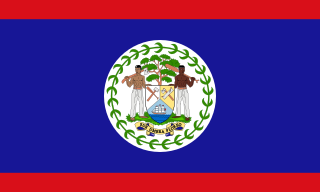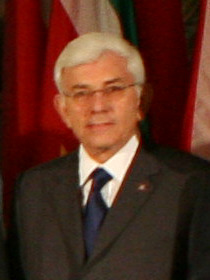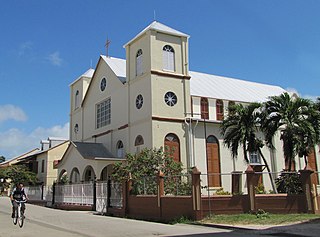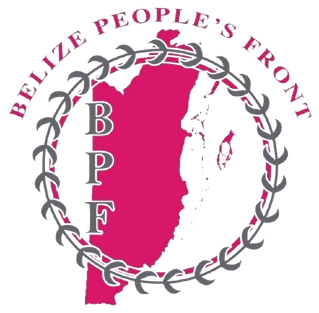Related Research Articles

Belize is a country on the north-eastern coast of Central America. It is bordered by Mexico to the north, the Caribbean Sea to the east, and Guatemala to the west and south. It also shares a water boundary with Honduras to the southeast.

British Honduras was a Crown colony on the east coast of Central America, south of Mexico, from 1783 to 1964, then a self-governing colony, renamed Belize in June 1973, until September 1981, when it gained full independence as Belize. British Honduras was the last continental possession of the United Kingdom in the Americas.

Said Wilbert Musa is a Belizean lawyer and politician. He was the third prime minister of Belize from 28 August 1998 to 8 February 2008.

George Cadle Price was a Belizean statesman who served as the head of government of Belize from 1961 to 1984 and 1989 to 1993. He was the first minister and premier under British rule until independence in 1981 and was the nation's first prime minister after independence that year. He is considered one of the principal architects of Belizean independence. Today he is referred to by many as the "Father of the Nation". Price effectively dominated Belizean politics from the early 1960s until his 1996 retirement from party leadership, having been the nation's head of government under various titles for most of that period.

The People's United Party is one of two major political parties in Belize. It is currently the governing party of Belize after success in the 2020 Belizean general election, winning a majority of 26 seats out of 31 in the Belizean House of Representatives. It is a centre-left Christian democratic party. The party leader is Johnny Briceño, who currently serves as the Prime Minister of Belize.

The United Democratic Party is one of the two major political parties in Belize. It is currently the main opposition party, having lost the 2020 Belizean general election, after previously holding the government across three prior terms. Founded as a centre-right conservative party, the UDP is led by Moses Barrow.
The General Workers' Union (GWU) was a general union in Belize.
United Black Association for Development (UBAD) was a cultural and political party established in Belize in February 1969 and based on traditional Black Power tenets.
The Democratic and Agricultural Labour Party (DALP), more commonly referred to as the Christian Democratic Party (CDP), was a short-lived political party in Belize. It promoted Christian Democratic ideals.

General elections were held in Belize on 7 February 2008. Beginning with this election, Belizeans elected 31 members to the House of Representatives of Belize instead of 29. In what was considered an upset, the opposition United Democratic Party (UDP) won the election with 25 out of 31 seats; the ruling People's United Party won six.

Philip Stanley Wilberforce Goldson was a Belizean newspaper editor, activist and politician. He served in the House of Representatives of Belize as member for the Albert constituency from 1965 to 1998 and twice as a minister. Goldson was a founding member of both of Belize's current major political parties, the People's United Party (PUP) in the 1950s and the United Democratic Party (UDP) in the 1970s. He was also the leading spokesman of the hardline anti-Guatemalan territorial claims National Alliance for Belizean Rights party in the 1990s.

The history of Belize dates back thousands of years. The Maya civilization spread into the area of Belize between 1500 BC to 1200 BC and flourished until about 1000 AD. Several Maya ruin sites, including Cahal Pech, Caracol, Lamanai, Lubaantun, Altun Ha, and Xunantunich reflect the advanced civilization and much denser population of that period. The first recorded European incursions in the region were made by Spanish conquistadors and missionaries in the 16th century. One attraction of the area was the availability of logwood, which also brought British settlers.
Leigh Richardson was a Honduran-born Belizean politician. Richardson served as the leader of the People's United Party in the 1950s, and also as mayor of Belize City.

General elections were held in Belize on 4 November 2015 to elect members of the House of Representatives. On 28 September 2015 Prime Minister Dean Barrow announced that he had advised the Governor-General to dissolve the National Assembly and to fix Wednesday 4 November 2015 as the date for the next general elections.
Freetown is an electoral constituency in the Belize District represented in the House of Representatives of the National Assembly of Belize since 2003 by Francis Fonseca of the People's United Party. Fonseca served as PUP leader and Leader of the Opposition from 2011 to 2016.

This history of the Catholic church in Belize has three parts: the historical periods of the Catholic presence in Belize, religious congregations laboring in Belize, and apostolic works undertaken.

The Nationalist Movement seeking independence for Belize first arose in the 1930s and 1940s. Three groups played important roles in developing the movement. One group consisted of working-class individuals and emphasised labour issues. This group originated with Antonio Soberanis Gómez and the Labourers and Unemployed Association (LUA) between 1934 and 1937 and continued through the General Workers Union (GWU). The second group, a radical black nationalist movement, emerged during World War II. Its leaders came from the LUA and the local branch of Marcus Garvey's Universal Negro Improvement Association (UNIA). This group called itself variously the British Honduras Independent Labour Party, the People's Republican Party, and the People's National Committee. The third group consisted of people such as the Christian Social Action Group (CSAG) who engaged in electoral politics within the narrow limits defined by the constitution. From the 1950s onwards the nationalist movement came to be dominated by the People's United Party which led the country to independence in 1981.

The Belize People's Front is a Belizean progressive and social democratic centre-left political party founded in 2013. The BPF made its electoral debut in the 2020 Belizean general election on 11 November 2020, in which it fielded 13 candidates and became the third largest political party in the country. BPF's leader Nancy Marin is the first female political party leader in Belize.
The Christian Democratic Union (CDU) was a general union in Belize.
References
- ↑ "Nicholas Pollard: dead at 79". Great Belize Television . January 22, 2003. Retrieved 2021-08-27.
- Francis, Michael J. "Revolutionary Labor in Latin America: The CLASC." Journal of Inter-American Studies. 10:4 (October 1968).
- Grant, Cedric H. The Making of Modern Belize: Politics, Society, and British Colonialism in Central America. London: Cambridge University Press, 1976.
- Ysaguirre, William. "Trade Unions Honour Labour Leader Antonio Soberanis." Belize Reporter. July 14, 2006.